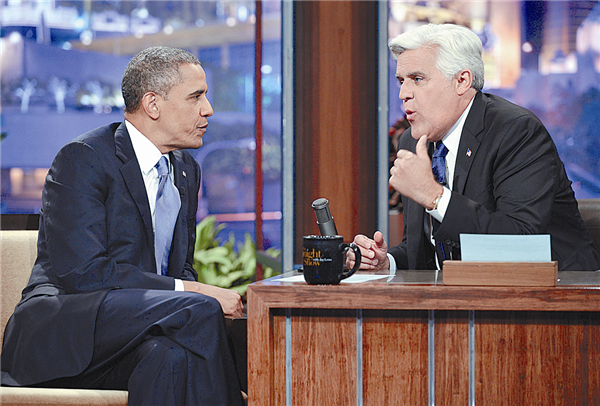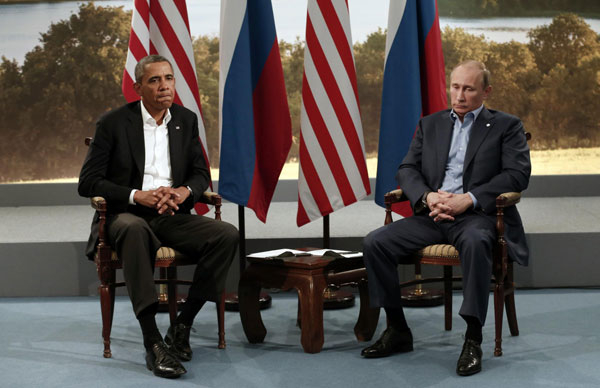Obama cancels Putin talks over Snowden asylum offer
Snub follows Moscow's granting whistle-blower shelter for one year
US President Barack Obama is canceling plans to meet with his Russian counterpart Vladimir Putin in Moscow next month - a rare diplomatic snub.
The move is retribution for Russia's decision to grant temporary asylum to Edward Snowden, who is accused of leaking highly secretive details about US National Security Agency surveillance programs. It also reflects growing US frustration with Russia on several issues, including missile defense and human rights.
A top White House official said Obama still plans to attend the Group of 20 economic summit in St. Petersburg, Russia, but has no plans to meet Putin one-on-one.
Obama said in an interview on Tuesday he was "disappointed" by Russia's move to grant Snowden asylum for one year. He said it also reflected the "underlying challenges" the US faces in dealing with Moscow.
 |
|
US President Barack Obama chats with host Jay Leno during a taping of The Tonight Show at NBC Studios on Tuesday in Burbank, California. Mandel Ngan / Agence France-Presse |
"There have been times where they slip back into Cold War thinking and a Cold War mentality," Obama said in an interview on NBC's The Tonight Show.
The US was expected to alert the Russians on Wednesday morning about Obama's decision, though the two presidents were not expected to speak directly. Obama and Putin last met in June on the sidelines of the G8 summit in Northern Ireland.
Instead of visiting Putin in Moscow, the US president will add a stop in Sweden to his early September travel itinerary.
White House Deputy National Security Adviser Ben Rhodes said Russia's decision last week to defy the US only worsened an already troubled relationship. With few signs progress would be made during the Moscow summit on other agenda items, Rhodes said the president decided to cancel the talks.
"We'll still work with Russia on issues where we can find common ground, but it was the unanimous view of the president and his national security team that a summit did not make sense in the current environment," Rhodes said.
 |
|
US. President Barack Obama, left, meets with Russian President Vladimir Putin during the G8 Summit at Lough Erne in Enniskillen, Northern reland June 17, 2013. [Photo/Agencies] |
Obama's decision is likely to deepen the chill in the already frosty relationship between the two leaders. They have frequently found themselves at odds on pressing international issues, most recently in Syria, where the US accuses Putin of helping President Bashar al-Assad fund a civil conflict.
Moscow has accused the US of installing a missile shield in Eastern Europe as a deterrent against Russia, despite US assurances that the shield is not aimed at its former Cold War foe. Putin also signed a law last year banning US adoptions of Russian children, a move that was seen as retaliation for the US measure that cleared the way for the human rights sanctions.
|
More details of US spying program to come Glenn Greenwald, the US journalist who published documents leaked by fugitive former US intelligence contractor Edward Snowden, plans to make new revelations "within the next 10 days or so" on secret US surveillance of the Internet. "The articles we have published so far are a very small part of the revelations that ought to be published," Greenwald said at a Brazilian congressional hearing on Tuesday that is investigating US Internet surveillance in Brazil. "There will certainly be many more revelations on spying by the US government and how it is invading the communications of Brazil and Latin America," he said in Portuguese. The Rio de Janeiro-based columnist for British newspaper The Guardian said he has recruited the help of experts to understand some of the 15,000 to 20,000 classified documents from the US National Security Agency that Snowden gave him, some of which are "very long and complex and take time to read". Reuters |





















